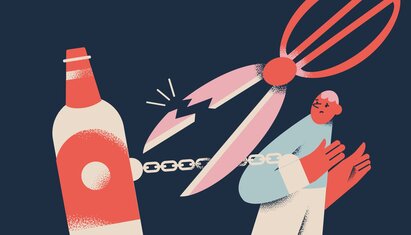Looking for a worksheet on anger management techniques to share with clients and improve their anger management skills?
This article includes an overview of different types of anger management techniques and exercises to strengthen anger management skills, along with free printable anger triggers worksheets that you can save to your electronic health record (EHR) and use in your therapy practice.
What is anger?
Anger is a powerful emotion that may show up in sessions for several reasons. For example, a client might describe feeling angry when their boundaries have been crossed, or experience anger that leads to destructive outcomes that affect their interpersonal relationships.
While anger is a natural and adaptive response to threats, it can sometimes be maladaptive in response to any number of triggers. The key is to teach clients how to express their anger in a healthier way by strengthening their anger management skills.
Types of anger management techniques
There are various anger management exercises and techniques, including:
- Cognitive restructuring: Cognitive behavioral therapy (CBT) helps clients to examine negative core beliefs and maladaptive thoughts leading to their anger. It can also help clients restructure their thoughts into more adaptive thoughts and behaviors.
- Relaxation techniques: Practices like deep breathing or progressive muscle relaxation can help reduce the intensity of anger and relax tense muscles.
- Dialectical behavioral techniques (DBT): DBT anger management activities emphasize strengthening distress tolerance and emotional regulation skills by using tools like REST, STOP, radical acceptance, and safe place visualization.
- Identify triggers: Working with a therapist to identify anger triggers can improve stress management and help clients develop coping strategies when anger arises. This anger management skill also increases awareness and enables clients to recognize the trigger and respond, instead of react.
- Acknowledge your feelings: Sometimes, anger is only a surface-level emotion, and digging a little deeper reveals other issues, like unmet needs, a personal boundary being crossed, or feeling deeply upset about something or someone.
- Improving communication skills: Rather than reacting aggressively or suppressing their feelings, assertive communication strategies can help clients express their feelings assertively without causing conflict.
- Somatic skills: Shaking, jumping up and down, running, or working out are great ways to take the heat out of anger and reduce stress.
- Distraction: Sometimes, the easiest thing to do is to focus on something else. Distraction techniques involve switching to a different task, leaving a conversation, asking to pause the conversation, or doing something like drawing or gardening to regulate emotions.
- Changing environment: Stepping away from a triggering situation can be a helpful strategy, enabling clients to take time out, regroup, and respond calmly.
These skills are also included in the anger management worksheets for adults, which you can download at the top of this article.
Benefits of learning anger management skills
Empowering clients to strengthen their anger management skills provides the following benefits:
Improved self-awareness
Anger management skills can help clients become more attuned to noticing their triggers, helping them respond more effectively. Working on their anger in therapy can also increase awareness of what is underlying their anger. For instance, they may uncover that they need to improve asserting their boundaries or feel frustrated in their job and want to leave.
Strengthened communication skills
By practicing anger management techniques like assertive communication, clients can improve their interpersonal relationships.
Enhanced emotional regulation
Anger management techniques focusing on distress tolerance will improve clients’ emotional regulation, causing less extreme responses.
Improved mental and physical well-being
Learning anger management skills can help clients reduce stress and lead to positive impacts on their relationships, mental health, and overall well-being.
How to use the anger management skills worksheet
Therapists can use this downloadable anger management skills worksheet with clients in several ways:
- To illustrate the anger management techniques during in-person or virtual client sessions
- As a self-management anger management worksheet for clients to work on as homework
- A handout to remind clients of what you discussed in the session
Sources
- American Psychological Association. (2023). Control anger before it controls you.
- Henwood K, S., Chou S, Browne K, D. (2015). A systematic review and meta-analysis on the effectiveness of CBT informed anger management.
- Reilly, P.M., Shopshire, M.S., Durazzo, T.C., & Campbell, T.A. (2019). Anger management for substance use disorder and mental health clients: Participant workbook. SAMHSA Publication No. PEP19-02-01-002. Rockville, MD: Substance Abuse and Mental Health Services Administration.
- Zhan J, Ren J, Sun P, Fan J, Liu C, Luo J. (2018). The neural basis of fear promotes anger and sadness counteracts anger.
How SimplePractice streamlines running your practice
SimplePractice is HIPAA-compliant practice management software with everything you need to run your practice built into the platform—from booking and scheduling to insurance and client billing.
If you’ve been considering switching to an EHR system, SimplePractice empowers you to streamline appointment bookings, reminders, and rescheduling and simplify the billing and coding process—so you get more time for the things that matter most to you.
Try SimplePractice free for 30 days. No credit card required.


